Do you want some tips on how to help your child make friends? Helping your child make friends involves creating opportunities for social interactions, teaching social skills, and providing support and encouragement. Here are some strategies on how to help your child make friends:
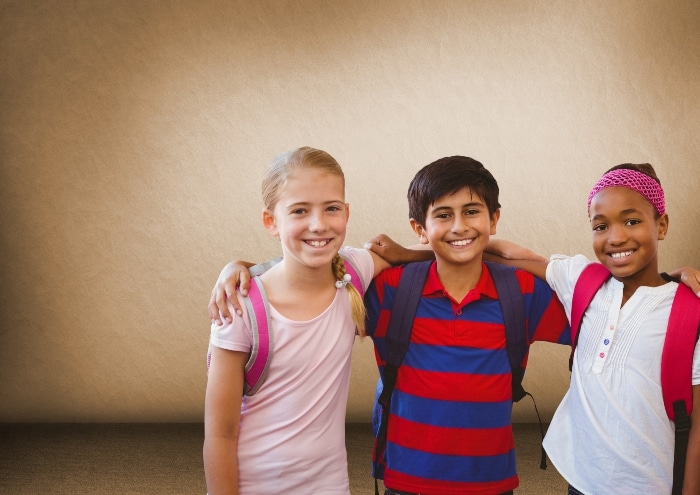
Model Positive Social Behavior
Modeling positive social behavior involves demonstrating actions and attitudes that promote healthy, respectful, and supportive interactions.
- Demonstrate good social skills, such as listening, sharing, and showing empathy.
- Show your child how to start a conversation, introduce themselves, and join group activities.
Create Opportunities for Social Interaction
Creating opportunities for social interaction is essential for fostering connections, improving well-being, and enhancing teamwork or collaboration in various environments.
- Arrange playdates with classmates or neighborhood kids.
- Encourage participation in extracurricular activities, such as sports, clubs, or arts and crafts.
Teach Social Skills
Social skills are essential for building relationships, communicating effectively, and navigating various social situations.
- Role-play different social scenarios with your child to practice skills like taking turns, making eye contact, and handling conflicts.
- Discuss the importance of being a good friend, such as being kind, supportive, and respectful.
Encourage Interests and Hobbies
Pursuing interests and hobbies is essential for personal growth, fulfillment, and well-being.
- Help your child find activities they enjoy, which can naturally lead to meeting like-minded peers.
- Attend community events or classes related to their interests.
Be Supportive and Encouraging
Being supportive and encouraging involves understanding others’ needs, offering genuine help, and fostering positivity.
- Praise your child for their efforts in making friends, even if they don’t always succeed.
- Offer comfort and advice if they face social challenges or rejection.
Create a Welcoming Environment
Creating a welcoming environment at home involves making it feel comfortable, inviting, and reflective of your personality.
- Make your home a friendly and inviting place for your child’s friends to visit.
- Provide fun activities and snacks to create a positive social atmosphere.
Foster Empathy and Understanding
Fostering empathy and understanding involves creating an environment where people can connect with each other on a deeper emotional level.
- Teach your child to understand and respect others’ feelings and perspectives.
- Encourage them to be inclusive and open-minded.
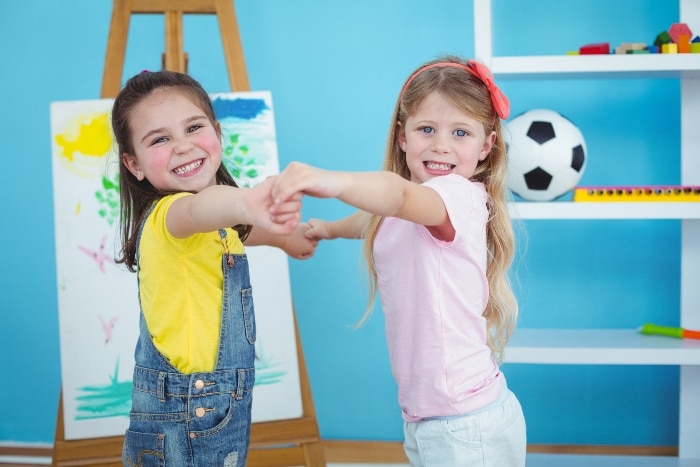
Monitor and Guide Without Overstepping
Monitoring and guiding children without overstepping is a delicate balance. It’s about giving them space to grow and make mistakes while ensuring they feel supported and safe.
- Keep an eye on your child’s social interactions and step in if necessary, but give them space to navigate friendships on their own.
- Offer guidance and support, but avoid micromanaging their social life.
Build Confidence
Building a child’s confidence is essential for their overall development and emotional well-being. Confidence helps them navigate challenges, build resilience, and feel comfortable in their own skin.
- Help your child build self-esteem by focusing on their strengths and accomplishments.
- Encourage them to take small social risks, such as talking to a new classmate or joining a new group.
Communicate with Teachers and Other Parents
Fostering friendships for your child involves a mix of communication and encouragement. Creating a supportive environment for both your child and yourself can make a big difference in building lasting friendships.
- Stay in touch with your child’s teachers to understand their social interactions at school.
- Collaborate with other parents to arrange social activities and support your child’s friendships.
Teach Conflict Resolution
Teaching conflict resolution to kids involves simplifying the concepts and making them engaging and relatable.
- Friendships can involve occasional disagreements or misunderstandings. Teach your child how to handle conflicts calmly and respectfully.
- Encourage them to talk through issues, listen to their friend’s perspective, and find compromises or solutions together.
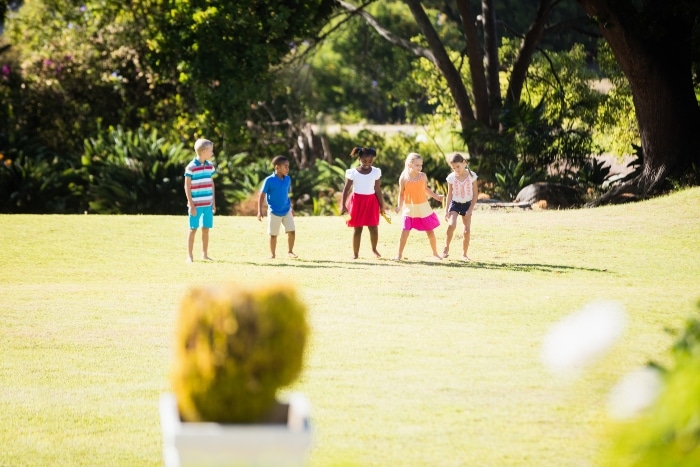
Help with Emotional Regulation
Emotional regulation involves managing and responding to your emotions in a healthy way.
- Emotional outbursts can affect relationships, so guide your child in managing their emotions.
- Teach techniques like deep breathing, taking a break, or expressing feelings with words to navigate social situations calmly.
Encourage Group Activities
Encouraging kids to join group activities can be really beneficial for their social development and overall well-being.
- Suggest participating in group settings, such as joining a community sports team or a group project at school. This allows your child to interact with multiple peers, increasing their chances of finding compatible friends.
- Group activities help kids learn how to cooperate, share, and be inclusive, which are essential for friendship-building.
Avoid Pushing Too Hard
Pushing kids too hard to make friends can sometimes backfire. It’s important to let them develop relationships at their own pace and in their own way. Encouraging social interactions is great, but it’s also important to respect their comfort levels and natural tendencies. Forcing social situations can lead to anxiety or resentment. Creating a supportive environment where they feel safe and valued can often lead to more organic and positive social interactions.
- Every child has their own social pace, and some may be more introverted or shy than others. Be patient and avoid pressuring your child to make friends quickly.
- Give them time to build relationships naturally and in a way that feels comfortable to them.
Discuss Peer Pressure and Boundaries
Discussing peer pressure and boundaries can be challenging but essential for healthy relationships and personal well-being.
- It’s important that your child learns how to recognize peer pressure and set healthy boundaries in friendships.
- Talk about the importance of saying no when they feel uncomfortable and how a good friend will respect their limits.

Encourage Friendships Outside of School
Encouraging friendships outside of school can be a great way to broaden social circles and build connections.
- Not all friendships need to be school-based. Encourage relationships through clubs, sports, or community activities, where your child may meet peers with similar interests.
- Summer camps, online communities (monitored appropriately), or hobby-based groups can also offer opportunities to meet new people.
Celebrate Diversity
Celebrating diversity in friendships is a wonderful way to enrich your life and build meaningful connections. The goal is to foster an environment of mutual respect and appreciation, which ultimately strengthens and deepens your friendships.
- Encourage your child to appreciate and respect differences in others. Friendships can blossom when children are open to people with diverse backgrounds, interests, or personalities.
- Teach your child that being different is a good thing and can make friendships more interesting and enriching.
Stay Involved
Balancing involvement with giving your child space to manage their own relationships is key, though. It’s important to offer guidance without being overly controlling or intrusive.
- While fostering independence, it’s essential to stay involved in your child’s social life, especially when they are younger.
- Keep an open dialogue with them about how their friendships are going, any struggles they’re facing, and how you can help.
Encourage Inclusivity
Encouraging inclusivity with friends is all about creating an environment where everyone feels valued and respected.
- Help your child understand the value of including others, especially children who may be shy or left out. This not only helps those kids but also teaches your child to be a kind and inclusive friend.
- Being an inclusive friend can help your child build a reputation for kindness, attracting more friendships.
Reassure Them About Setbacks
It’s completely normal to experience setbacks when building friendships. Friendships often take time to develop and require effort from both sides. If you’re facing challenges or if things aren’t progressing as quickly as you’d like, it’s okay. Sometimes, it’s just a matter of finding the right people or circumstances.
- Sometimes friendships don’t work out, and that’s okay. Teach your child that not all friendships last, and sometimes people grow apart.
- Reassure them that they will find friends who truly appreciate them, and every experience (good or bad) is a chance to learn.
By providing a supportive environment, teaching essential social skills, and encouraging positive interactions, you can help your child develop lasting friendships. Follow these tips on how to help your child make friends.
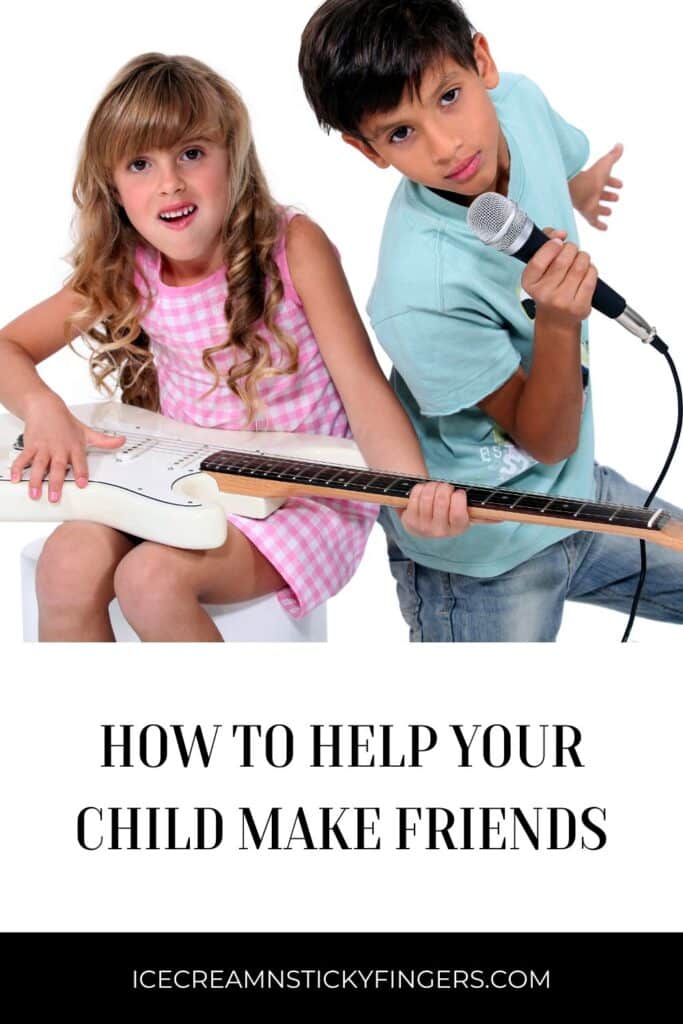





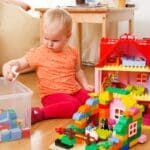

Great advice. Both my kids could be rather shy so this could be difficult. But I always told them to always be kind and they’ve always seemed to attract other kids.
This is such a wonderful post. I think it’s great when kids can make friends, especially on their own. It’s always good to have at least one really good friend.
My daughter has a hard time making friends. I will have to try some of these tips.
I have always tried to encourage my kids to do things such as sports and music, which are great for interpersonal skills and making friends. These are all wonderful points and are great ways for kids to build friendships.
These are great tips for when a child is just generally a bit more shy than other children. I’ve used some of these tips when my daughters were younger and they were very effective. Thanks for sharing!
so very true to make friends with these points in mind – having a diverse group of friends and not just from school – is so important.. my childhood friends are a big support system for me even today
It is important to the kids to have their children that’s why I appreciate your tips there. Because as an adult we need to teach them how to make one.